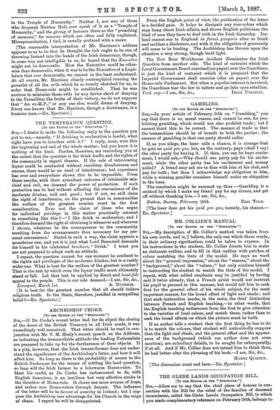GAMBLING.
[To TES EDITOR 01 THR SPBCTAT01."J
Sia,—In your article of February 26th on " Gambling," you- say that there is no moral reason, and cannot be one, for pro- hibiting gambling, which would not also prohibit trade ; but L cannot think this to be correct. The essence of trade is that the transactions should be of benefit to both the parties ; the essence of gambling is that one party should suffer.
If, as you allege, the loser sells a chance, it is strange that he gets no quid pro quo, but, on the contrary, pays (shall I say). the other party for baying it. If, then, you say he buys excite- ment, I would ask,—Why should one party pay for his excite- ment, while the other party has his excitement and money added? A friend may ask me to dine with him at his club, and. pay for both ; but then I acknowledge my obligation to him, while a winning gambler considers himself under no obligation to the loser.
The conclusion might be summed up thus :—Gambling is a method by which I make my friend pay for my dinner, and get off without thanking him.—I am, Sir, &c.,
Sutton, Surrey, February 28th. ERIC TODD.
[The loser does get his quid pro quo, namely, his chance.-- En. Spectator.]


































 Previous page
Previous page